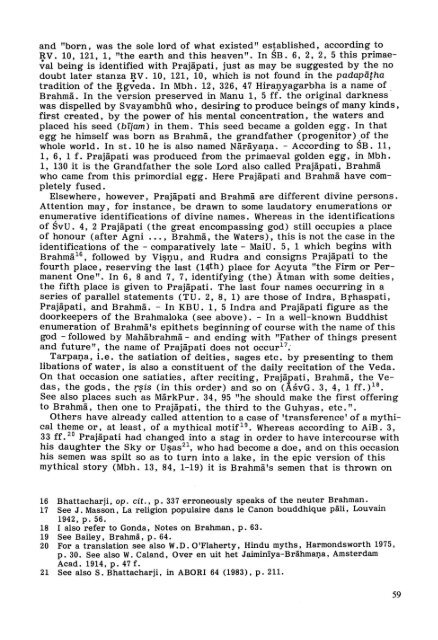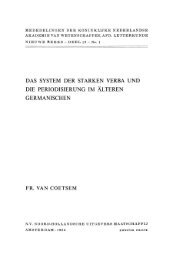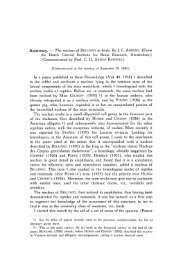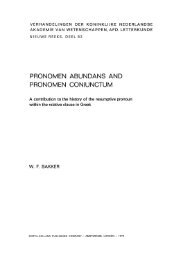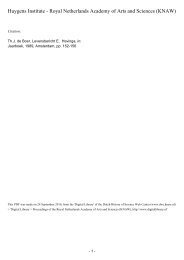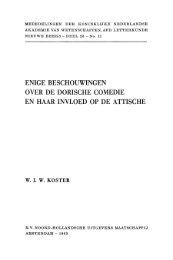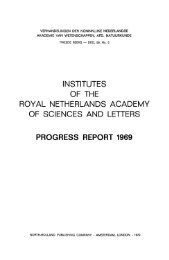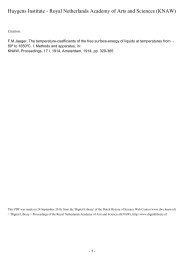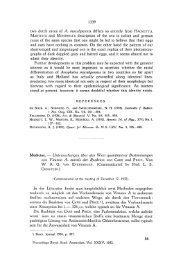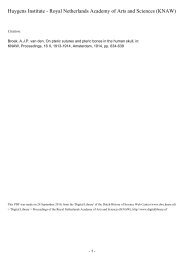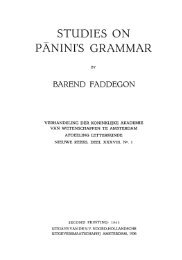Prajapati's relations with Brahman, Brhaspati and Brahma - DWC
Prajapati's relations with Brahman, Brhaspati and Brahma - DWC
Prajapati's relations with Brahman, Brhaspati and Brahma - DWC
You also want an ePaper? Increase the reach of your titles
YUMPU automatically turns print PDFs into web optimized ePapers that Google loves.
<strong>and</strong> "born, was the sole lord of what existed" established, according to<br />
RV. 10, 121, 1, "the earth <strong>and</strong> this heaven". In SB. 6, 2, 2, 5 this primaeval<br />
being is identified <strong>with</strong> Prajäpati, just as may be suggested by the no<br />
doubt later stanza !.tV. 10, 121, 10, which is not found in the padapätha<br />
tradition of the !.tgveda. In Mbh. 12, 326, 47 HiraI:tyagarbha is a name of .<br />
Brahmä. In the version preserved in Manu 1, 5 ff. the original darkness<br />
was dispelled by Svayambhü who, desiring to produce beings of many kinds,<br />
first created, by the power of his ment al concentration, the waters <strong>and</strong><br />
placed his seed (bïjam) in them. This seed became a golden egg. In that<br />
egg he himself was born as Brahmä, the gr<strong>and</strong>father (progenitor),of the<br />
whole world. In st. 10 he is also named NäräyaI).a. - According to SB. 11,<br />
1, 6, 1 f. Prajäpati was produced from the primaeval golden egg, in Mbh.<br />
1, 130 it is the Gr<strong>and</strong>father the sole Lord also called Prajäpati, Brahmä<br />
who came from this primordial egg. Here Prajäpati <strong>and</strong> Brahmä have completely<br />
fused.<br />
Elsewhere, however, Prajäpati <strong>and</strong> Brahmä are different divine persons .<br />
Attention may, for in stance , be drawn to some laudatory enumerations or<br />
enumerative identifications of divine names. Whereas in the identifications<br />
of SvU. 4, 2 Prajäpati (the great encompassing god) still occupies a place<br />
of honour (af ter Agni ... , Brahmä, the Waters), this is not the case in the<br />
identifications of the - comparatively late - MaiU. 5, 1 which begins <strong>with</strong><br />
Brahmä 16, followed by Vil?I).U, <strong>and</strong> Rudra <strong>and</strong> consigns Prajäpati to the<br />
fourth place, reserving the last (14th) place for Acyuta "the Firm or Permanent<br />
One". In 6, 8 <strong>and</strong> 7, 7, identifying (the) Ätman <strong>with</strong> some deities,<br />
the fifth place is given to Prajäpati. The last four names occurring in a<br />
series of parallel statements (TU. 2, 8, 1) are those of Indra, <strong>Brhaspati</strong>,<br />
Prajäpati, <strong>and</strong> Brahmä. - In KB U. 1, 5 Indra <strong>and</strong> Prajäpati figure as the<br />
doorkeepers of the <strong>Brahma</strong>loka (see above). - In a well-known Buddhist<br />
enumeration of Brahmä 's epithets beginning of course <strong>with</strong> the name of this<br />
god - followed by Mahäbrahmä - <strong>and</strong> ending <strong>with</strong> "Fat her of things present<br />
<strong>and</strong> fut ure " , the name of Prajäpati does not occur l7 :<br />
TarpaI).a, i.e. the satiation of deities , sages etc. by presenting to them<br />
libations of water, is also a constituent of the daily recitation of the Veda.<br />
On that occasion one satiaties, after reciting, Prajäpati, Brahmä, the Vedas,<br />
the gods, the r~is (in this order) <strong>and</strong> so on (ÄsvG. 3, 4,1 ff.)18.<br />
See also places such as MärkPur. 34, 95 "he should make the first offering<br />
to Brahmä, then one to Prajäpati, the third to the Guhyas, etc.".<br />
Others have already called attention to a case of 'transference' of a mythical<br />
theme or, at least, of a mythical motif 19. Whereas according to AiB. 3,<br />
33 ff. 20 Prajäpati had changed into a stag in order to have intercourse <strong>with</strong><br />
his daughter the Sky or U l?as 21 , who had become a doe, <strong>and</strong> on this occasion<br />
his semen was spilt so as to turn into a lake, in the epic version of this<br />
mythical story (Mbh. 13, 84, 1-19) it is Brahmä's semen that is thrown on<br />
16 Bhattacharji, op. eit. , p. 337 erroneously speaks of the neuter <strong><strong>Brahma</strong>n</strong>.<br />
17 See J. Masson, La religion populaire dans Ie Canon bouddhique päli, Louvain<br />
1942, p. 56.<br />
18 I also refer to Gonda, Notes on <strong><strong>Brahma</strong>n</strong>, p. 63.<br />
19<br />
20<br />
See Bailey, Brahmä, p. 64.<br />
For a translation see also W. D. 0 'Flaherty, Hindu myths, Harmondsworth 1975,<br />
p. 30. See also W. Cal<strong>and</strong>, Over en uit het Jaiminïya-BrähmaQa, Amsterdam<br />
Acad. 1914, p. 47 f.<br />
21 See also S. Bhattacharji, in ABORI 64 (1983), p. 211.<br />
59


